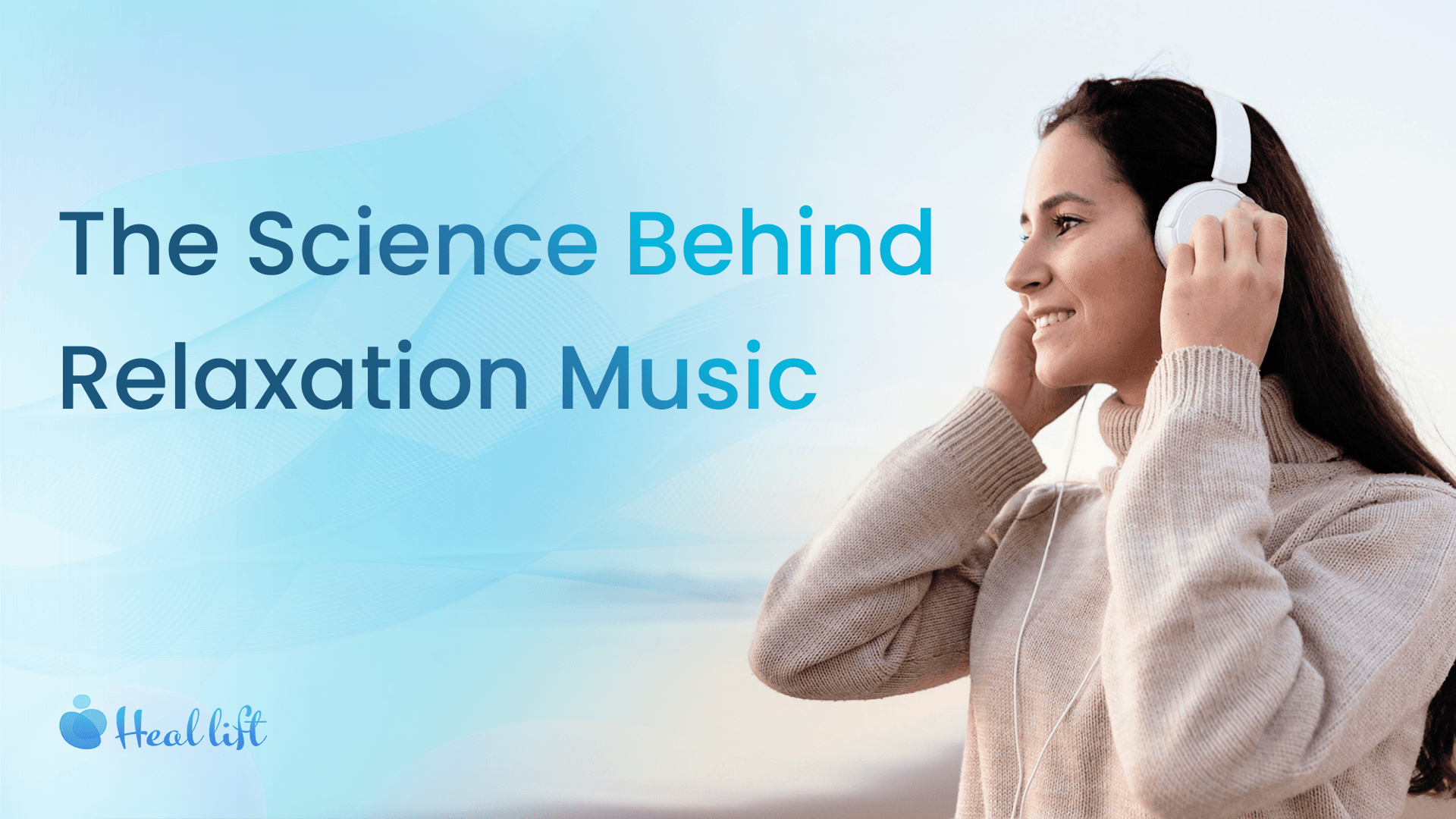HealLift - 12 Sep 2023
Science Behind Relaxation Music
The researchers have found that listening to relaxation music can improve your mind & body.

Heal Lift

You feel good and refreshed when you listen to your favorite song, don’t you? Have you ever wondered “why”?
Let's take a deep dive into the science behind relaxation music. In this article, we'll get to know what relaxation music is all about, discover its impact on our minds, explore how our brain waves come into play, and find out which types of tunes are best for relaxation.
What is Relaxation Music?
Relaxation music is a genre of music specifically composed and designed to promote relaxation, reduce stress, and induce a sense of calm and tranquility in the listener. To look at a few researches and understand how relaxation music is defined, R. Keith Brown (1997) defines relaxation music as "music that is designed to reduce stress and anxiety and promote a sense of calmness and well-being", which we all can relate to, couldn’t we? Margaret J. Paul (2011) defines relaxation music as "music that helps people to relax, reduce stress, and improve sleep". Likewise, we can go on and on but there is no single definition of relaxation music that is universally agreed upon by scholars.
However, some common features that are often cited as being characteristic of relaxation music include;
- Slow tempo (60-80 beats per minute)
- Simple, repetitive melody
- Low volume
- Soothing, calming harmonies on piano, acoustic guitar, flute, harp, strings, and synthesizers.
- Natural sounds, such as water or birdsong
- Lack of sudden changes in volume or tempo
- Absence of Lyrics
Relaxation music sets itself apart from other music genres primarily through its intended purpose and the emotional response it aims to evoke. It is carefully crafted to evoke feelings of calmness, reduce stress, and facilitate relaxation. Its distinct characteristics differentiate it from other musical genres that serve different purposes and emotional experiences.
Psychological Effects
When it comes to relaxation music, its impact on the mind is quite interesting. Music not only stimulates intense emotional responses and memories, but it can also change the structure of the brain. According to research, music may be beneficial in alleviating anxiety, enhancing mood, relieving stress and better sleep, while helping you to relax.
1. Enhancing your Mood
Relaxation music can evoke feelings of calmness, tranquility, and happiness. This effect is attributed to the interplay between music and our brain's limbic system, which is responsible for regulating emotions. Music causes the release of dopamine in the brain which is a neurotransmitter that promotes happy and exciting feelings.
2. Relieving Stress
One of the most well-known benefits of relaxation music is its capacity to reduce stress. Stress, a prevalent issue in modern society, can have detrimental effects on both physical and mental health. Relaxation music can serve as a powerful tool to counteract these negative effects.
3. Relaxation
Relaxation music is designed with the intention of inducing a state of relaxation in the listener. This is often achieved through the use of slow tempos, soft melodies, and soothing sounds like flowing water or gentle wind. The brain responds to these elements by slowing down its neural activity, leading to a relaxed mental state.
4. Better Sleep
One of the key aspects that contribute to sleep quality is how well your brain waves settle down after 90 minutes after falling asleep. Listening to music not only helps you sleep better overall, but it also helps you fall asleep.
The Role of Brain Waves
Our brains release brain waves continuously throughout the day, and the frequency of those waves varies based on the task we're performing. Brainwaves, or rhythmic, repeated frequencies, are an indication of electrical activity in the brain. There are four different types of brainwaves, ranging from the most active to the least active frequencies.
Beta Waves - The quickest kind of brain waves that are produced when the brain is mentally active and engaged.
Alpha Waves - Happen when the brain is in a non-arousal state, such as after someone completes a task and is relaxing or while someone is meditating
Theta Waves - Linked to rapid eye movement dreaming when you sleep and daydreaming. When you are engaged in an activity like long-distance running or motorway driving, theta brain waves are produced. This kind of state is frequently linked to periods when creativity and ideas are flowing.
Delta Waves - The slowest brainwaves, known as delta waves, are linked to a profound, dreamless sleep.
Best Music for Relaxation
Slower music has been proved to be more soothing, just as quick, energetic music can deliver a rush of energy while exercising. Classical music, in particular, can assist to calm the pulse and heart rate, as well as lower stress hormone levels. So, if you want to unwind after a long day, listen to slower instrumental, classical, or ambient music.
Rhythm and pace have a direct impact on the body's physiological responses. The synchronization of a song's rhythm with the intrinsic rhythms of the body results in a slower heart rate and more controlled breathing, mirroring physiological relaxation rhythms. Smooth, undulating melodies evoke happy feelings and induce the release of neurotransmitters associated with pleasure and well-being, such as dopamine and serotonin.
Try Heallift to listen to the best relaxation music.
Aside from rhythm and melody, sound wave frequency, measured in hertz (Hz), has therapeutic potential. Frequencies ranging from 250 to 600 Hz, which are frequently heard in relaxing compositions, resonate with the body's natural frequency, promoting relaxation and emotional balance. The incorporation of sounds such as running water, birdsong, or rustling leaves with music creates an immersive aural experience that harkens back to humanity's relationship to the natural world. These noises elicit a primordial sense of security and harmony, triggering the release of oxytocin, a hormone known to promote feelings of trust and connection.
Conclusion
The science behind relaxation music reveals its profound impact on our mental and emotional well-being. This genre of music, characterized by slow tempos, soothing melodies, and the absence of lyrics, has been shown to induce a state of calmness, reduce stress, and enhance overall mood. The psychological effects of relaxation music are far-reaching, as it can alleviate anxiety, stress, and even pain associated with various health issues.
Music can alter brain structure and trigger the release of dopamine, promoting happiness and relaxation. Playing a vital role in modulating brain waves, slower music synchronizes with the body's rhythms to create a sense of tranquility. The choice of music, including classical and ambient genres, can directly affect physiological responses. Melodic patterns and sound wave frequencies also contribute to the therapeutic potential of relaxation music, promoting emotional balance and reducing tension.
So it's not only in your thoughts; the music you listen to has a big impact on your mood.
References
Koelsch, S. (2014). Brain correlates of music-evoked emotions. Nature Reviews Neuroscience.
Magee, W. L., & Davidson, J. W. (2002). The Effect of Music Therapy on Mood States in Neurological Patients: A Pilot Study. Journal of Music Therapy.
Oerther, S., & Oerther, D. B. (2017). Pierre Bourdieu’s Theory of Practice offers nurses a framework to uncover embodied knowledge of patients living with disabilities or illnesses: A discussion paper. Journal of Advanced Nursing.
O’Hare, J. (2023). The Soothing Power of Sound: Best Therapeutic Songs for Anxiety Relief. [online] A Beautiful Soul Holistic Counseling.
Shyu, K.-G., Wang, B.-W., Chen, W.-J., Kuan, P., & Hung, C.-R. (2010). Mechanism of the inhibitory effect of atorvastatin on endoglin expression induced by transforming growth factor-β1 in cultured cardiac fibroblasts. European Journal of Heart Failure.
Thoma, M. V., La Marca, R., Brönnimann, R., Finkel, L., Ehlert, U., & Nater, U. M. (2013). The Effect of Music on the Human Stress Response. PLoS ONE.
